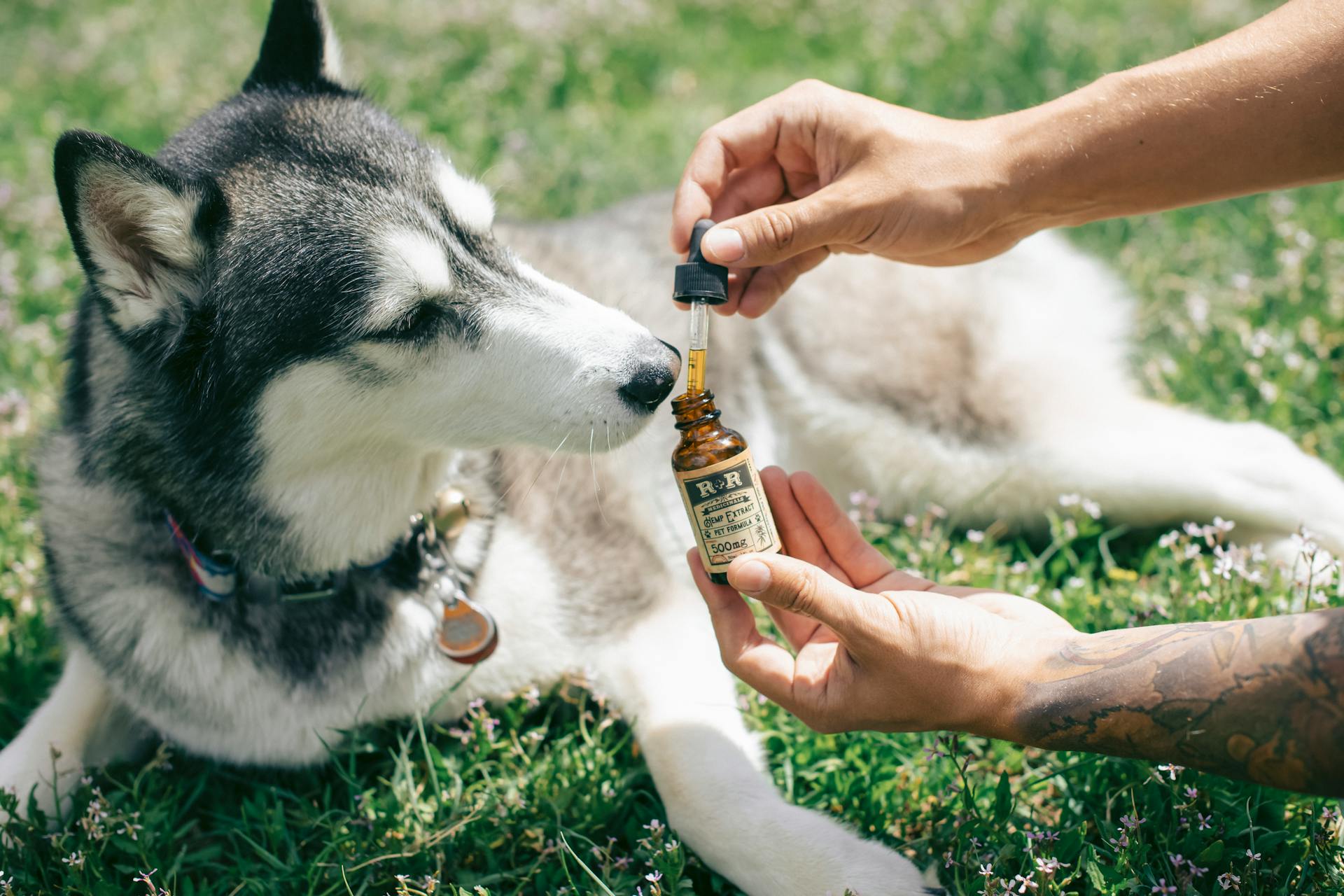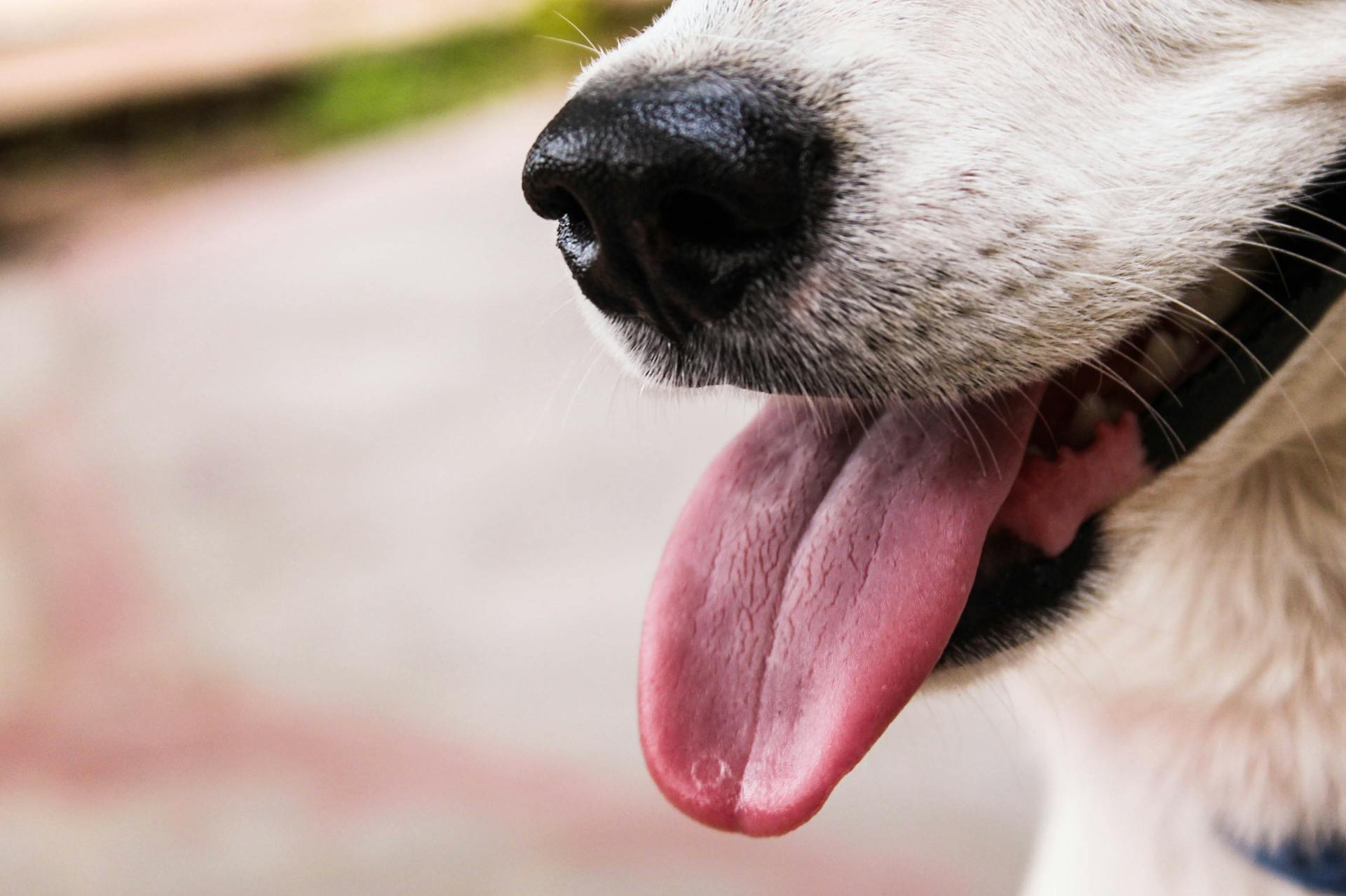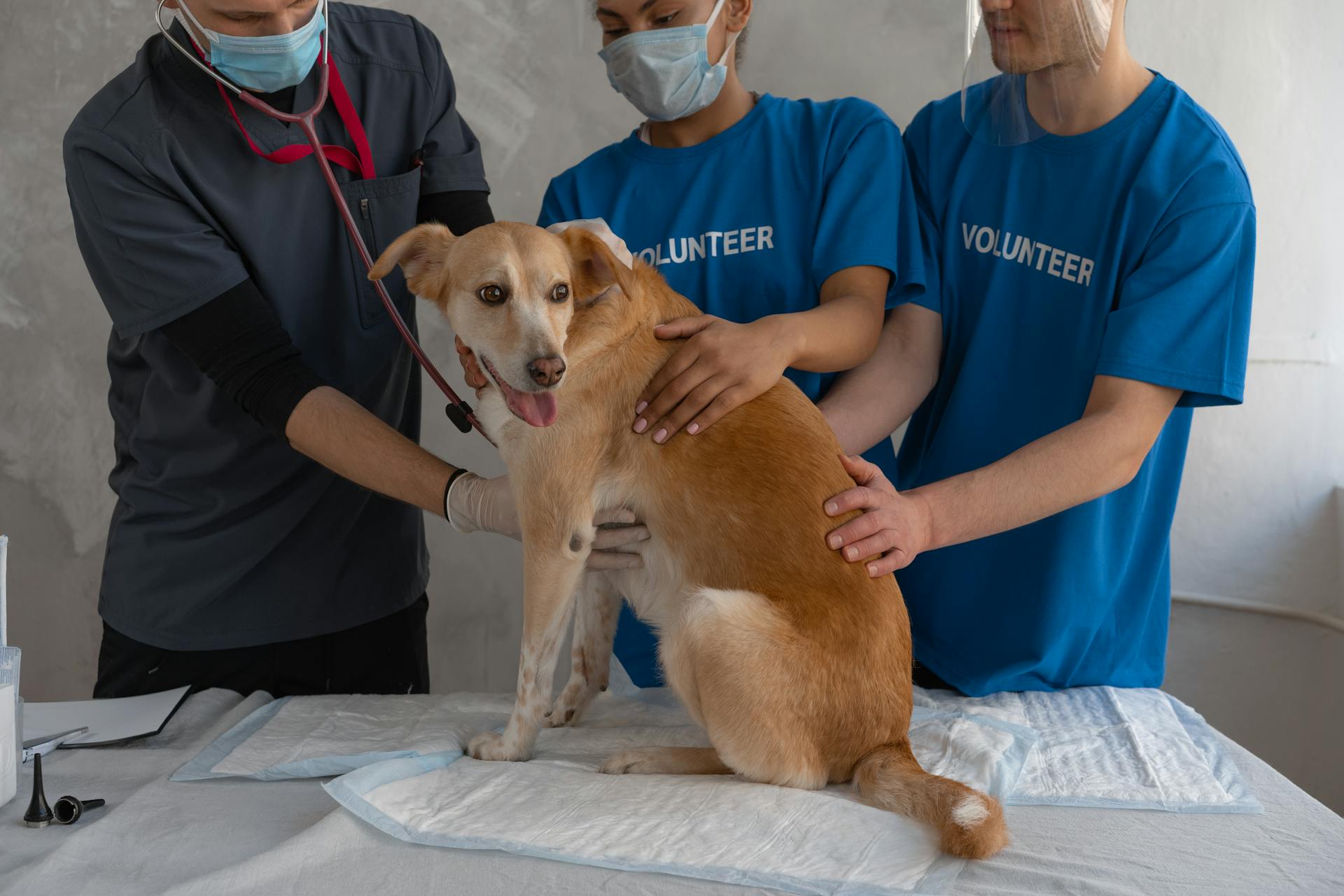
Dogs vomiting food can be a stressful and worrisome experience for pet owners.
Food poisoning is a common cause of vomiting in dogs, often resulting from eating spoiled or contaminated food.
A sudden change in diet can also trigger vomiting, especially if your dog is not used to eating certain ingredients.
Common symptoms of food poisoning in dogs include vomiting, diarrhea, and lethargy.
Dogs with sensitive stomachs may also be more prone to vomiting after eating.
Discover more: Dogs and Vomiting Undigested Food
Causes and Symptoms
Dogs vomiting food can be a concerning issue for any pet owner. Frequent throwing up can be a sign of a serious medical condition, so it's essential to watch for symptoms like abdominal pain, weakness, and vomiting with blood in it.
If your dog is vomiting food and also has any of these symptoms, take them to the vet immediately. The causes of dog vomiting are many, and they can range from a simple dietary indiscretion to a more serious malady.
Dietary indiscretion, which includes eating table scraps, trash, or foreign objects, is a common cause of vomiting in dogs. This can also lead to more serious issues like pancreatitis, cancer, kidney disease, and anemia.
Some other possible causes of vomiting in dogs include parasites like tapeworms and roundworms, food allergies, diabetes, constipation, and Cushing's syndrome. These conditions can lead to vomiting as a side effect or as a primary symptom.
Here are some common behaviors your dog may exhibit before and after vomiting:
- Stomach heaves
- Drooling
- Excessive swallowing
- Nausea
- Retching
- Depression
- Lack of appetite
- Coughing
If you suspect that your dog is going to be sick, look for signs like drooling, licking their lips, and swallowing excessively. Some dogs may also eat grass or try to make themselves sick.
If your dog is vomiting and not eating, it's essential to check with your vet to rule out serious conditions. Frequent vomiting can be a sign of a serious medical issue, so it's always better to err on the side of caution and seek professional help.
Treatment and Remedies
If your dog is vomiting food, it's essential to act quickly and seek veterinary attention if the vomiting persists or is severe.
Take your dog to the vet if they vomit more than once in a day, or for more than 24 hours, as this can lead to dehydration and electrolyte imbalances. Your vet will examine your dog and may perform tests such as blood tests, fecal tests, ultrasound, biopsy, radiographs, or endoscopy to determine the cause of the vomiting.
The vet may prescribe antibiotics if the vomiting is caused by an infection, or antiemetics to control vomiting. Fluid therapy may also be necessary to treat dehydration. In some cases, a diet change may be recommended, such as feeding your dog a bland diet of skinless chicken, boiled potatoes, and rice.
If your dog is vomiting bile, a fasting approach may be recommended, where food is withheld for 24 hours and then reintroduced gradually. Your vet may also prescribe medication to eliminate parasites or treat a gastric motility disorder.
Related reading: Vet Approved Homemade Dog Food Recipes for Large Dogs
To help manage your dog's vomiting at home, you can try withholding food for 12 hours and giving antinausea and antacid medications. You can also feed a bland diet for a few days, such as boiled chicken and rice.
Here's a step-by-step guide to help your dog recover from vomiting:
- Remove all food and water for 2 hours
- Allow your dog to have small amounts of water, but withhold food for a further 6-8 hours
- Reintroduce small meals of a bland low-fat cooked food, such as chicken or white fish and rice
- Gradually return to a normal diet the following day, introducing small meals and gradually increasing the proportion of normal diet
Understanding Vomiting
Dogs can throw up for a variety of reasons, and it's essential to identify the root cause to find the best solution.
Some possible causes of vomiting include intestinal parasites, bacterial infections, ingestion of toxic substances, diet change, food intolerances, bloat, foreign substances in the gastrointestinal system, viral infections, heatstroke, acute kidney failure, pancreatitis, acute liver failure, certain medications, intestinal inflammation, intestinal obstruction, constipation, cancer, kidney failure, liver failure, parvovirus, colitis, and uterine infection.
If your dog is vomiting frequently, it can be a sign of a serious medical condition. Look out for symptoms like abdominal pain, weakness, vomit with blood in it, depression, weight loss, dehydration, and fever. If your dog is throwing up food and exhibiting any of these symptoms, take them to the vet right away.
If your dog is vomiting but still eating and has normal bowel movements, it might be an isolated incident. However, if your dog is vomiting and not eating, you should consult with your vet to rule out serious conditions.
Some common signs that your dog is about to throw up include drooling, licking their lips, swallowing excessively, stomach heaves, nausea, retching, depression, lack of appetite, and coughing.
Regurgitation
Regurgitation is often confused with vomiting, but they're not the same thing. According to the Merck Veterinary Manual, regurgitation is the release of food and fluids from the esophagus, which tends to be undigested, covered in a slimy mucus, and in a tube-like shape.
Regurgitation doesn't require effort or stomach muscle contractions, and it often occurs right after eating or drinking. Some dogs may exhibit a lack of interest in their food, or they might eat grass to relieve gastric irritation.
Regurgitation can be a normal process in dogs, especially after eating a large meal or drinking a lot of water. However, if your dog is regurgitating frequently or showing other signs of illness, it's always best to consult with a veterinarian.
Here are some key differences between vomiting and regurgitation:
What is?
Vomiting with bile in dogs is a serious condition that requires prompt attention from a veterinarian. The bile can be hard on the stomach and esophagus, leading to further complications.
Healthy dogs may occasionally vomit without an identifiable cause, but cases of acute or chronic vomiting with bile should always be discussed with a veterinarian.
Bile aids in the digestion of food, and vomiting bile is an abnormal condition that needs to be addressed promptly.
The cost of treating vomiting with bile can range from $300 to $3,500, with an average cost of $1,100.
Diagnosis and Recovery
Diagnosis is key to treating your dog's vomiting issues. A thorough history is essential, so be prepared to answer questions like when your dog vomited, how many times, and what the vomit looked like.
Your veterinarian may need to perform a physical exam, bloodwork, urine analysis, X-rays, or ultrasound imaging to arrive at a diagnosis. This can help identify the underlying cause of the vomiting.
If your dog's vomiting is caused by a minor issue, treatment may be as simple as withholding food for 12 hours, giving antinausea and antacid medications, or feeding a bland diet for a few days. However, more serious cases may require inpatient hospital treatment, such as intravenous fluids and medications, regular monitoring, or surgery to remove any foreign objects.
Here are some common diagnostic tests your veterinarian may use:
Recovery from vomiting can be quick and easy if the underlying cause is minor. However, more serious cases may require a longer recovery period, with exercise limitations and rest periods. Regular check-ups with your veterinarian are essential to ensure your dog's health and happiness.
Readers also liked: Homemade Recovery Food for Dogs
Diagnosis of Bile
Schedule a visit with the veterinarian promptly for a diagnosis of vomiting with bile, as you don't want the problem to lead to even more serious consequences.
A vomiting record is a valuable tool for the veterinarian, so keep track of how often your dog vomits, whether the vomit is bile only, occasionally mixed with bile, or sometimes containing partially digested food.

It's essential to note that sporadic vomiting may show a normal test result in the diagnostic stage, which is why a thorough examination and record-keeping are crucial.
The veterinarian may order a blood count, blood profile, and chemical profile, as well as a urinalysis, which can provide valuable information about your dog's overall health.
Having a sample of the vomit can also be helpful to the veterinarian in making a diagnosis.
A fecal smear may be done to verify if there are parasites present, which can be a contributing factor to vomiting with bile.
Further diagnostic tools may include radiograph or ultrasound of the abdomen to look for the presence of an obstruction or foreign body.
Diagnosis and Treatment
A thorough history is key in vomiting cases, so be prepared to answer questions about when your dog vomited, how many times, how much, and what the vomit looked like.
Your vet will first examine your dog, then use what you tell them and what they learn from the examination to decide on further tests, such as blood tests, fecal tests, ultrasound, biopsy, radiographs, and endoscopy.

If your dog vomits more than once in a day, without a break, or for more than 24 hours, you should see a vet. A dog throwing up mucus occasionally may not be a cause for concern, but frequent vomiting of mucus requires veterinary attention.
Treatment is tailored to the diagnosis, and may include withholding food for 12 hours, giving antinausea and antacid medications, and feeding a bland diet for a few days.
Your vet may prescribe antibiotics if the vomiting is a result of an infection, or antiemetics to control vomiting. In some cases, fluid therapy and surgery may be necessary.
A vomiting record is a valuable tool for the veterinarian, and can help lead to a quicker diagnosis. Important points to note are how often the dog vomits, and whether the vomit is bile only, occasionally mixed with bile, or sometimes containing partially digested food.
Here are some potential treatments for dog vomiting:
- Withholding food for 12 hours
- Giving antinausea and antacid medications
- Feeding a bland diet for a few days
- Antibiotics for infections
- Antiemetics to control vomiting
- Fluid therapy
- Surgery for foreign objects or obstructions
It's essential to explain everything carefully to the vet to help them make the correct diagnosis and provide the best treatment for your dog.
Recovery

Recovery is usually a smooth process for dogs who vomit with bile. Most dogs will respond quickly and favorably to treatment.
The key to a successful recovery is addressing the underlying cause of the vomiting. Once that's done, your pet should be back to normal in no time.
Regular check-ups and consultations with the veterinarian are crucial to ensure your dog stays healthy and happy.
Sources
- https://www.webmd.com/pets/dogs/vomiting-dogs-causes-treatment
- https://franktownanimalclinic.com/what-to-do-when-your-dog-is-vomiting/
- https://wagwalking.com/condition/vomiting-bile
- https://www.dailypaws.com/dogs-puppies/health-care/dog-conditions/dog-vomiting
- https://www.vets-now.com/pet-care-advice/dog-being-sick/
Featured Images: pexels.com


